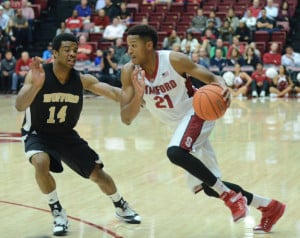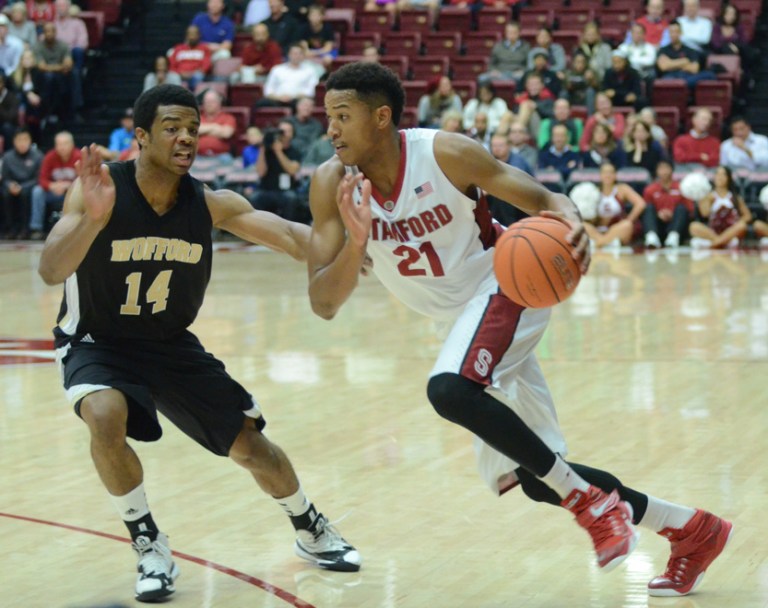For each of the last three seasons, Stanford’s final regular season game against Cal has epitomized senior guard Chasson Randle’s and fifth-year senior forward Anthony Brown’s seasons. As the end of the regular season approaches, the Stanford-Cal rivalry offers special insight into the trajectory of Brown and Randle’s careers since they arrived on the Farm.

Brown came to Stanford as a highly touted recruit out of Huntington Beach. The Cardinal had gotten through a forgettable 2009-10 season after the departure of the Lopez brothers to the NBA, and expectations were high for the 6-foot-6 forward.
After a decent freshman season in which he averaged 8.7 points and 3.2 rebounds per game, Brown started 21-of-37 games the following year. He was much more aggressive in half-court sets and looked to score on open shots instead of passing up opportunities. The defensively-oriented swingman adored set jump shots, as 80 percent of his shot attempts came from jumpers, per Synergy Sports Technology. Brown looked comfortable shooting off the pick and roll, though he didn’t seek out shots with regularity.
Brown’s sporadic passive demeanor showed during the Cardinal’s final regular season matchup with a talented Cal in Maples Pavilion. Stanford won 75-70 and reached its first 20-win season under head coach Johnny Dawkins. Surprisingly, Brown wasn’t as imposing, as was expected. He played 34 minutes, but finished with just 10 points on 4-of-10 shooting despite facing a slower defender in Allen Crabbe.
Then-freshman Chasson Randle, on the other hand, notched 17 points to lead all Stanford scorers. The freshman sensation played fearlessly all night, just as he had done throughout the season en route to a spot on the Pac-12 All-Freshman team. Though he lacked an explosive first step, Randle was extremely dangerous as a spot-up shooter and excelled at creating his own shot with his strong ball-handling.
Brown was sidelined the 2012-2013 season after opting for surgery to treat a congenital hip condition. Expectations for Brown were tamer than they had been prior to his debut season after two rather unremarkable years. Dawkins still believed Brown could successfully contribute to a resurgent Stanford program, though he recognized it would take considerable effort post-surgery to reach new heights with Brown.
The same season, Randle became more turnover-prone and his 3-point field goal percentage dipped from .438 during his freshman year to .359 the following season. Teams overplayed him on the perimeter and he lacked the finishing instinct in the paint to compensate. However, he developed an aggressive pick-and-roll game as a result and could still dazzle on the offensive end by orchestrating consistent screens for himself.
Randle pulled together a more polished game towards the end of the season thanks to the adjustments he was forced to make. In the last regular-season game against the Golden Bears, he dropped a dominant 20 points on 7-of-10 shooting, including 4-of-5 from 3-point range. In the first five minutes of the second half, Cal failed to hedge on two screens in the high-post and did not communicate on another at the 3-point line, resulting in seven straight points for Randle. Stanford edged out an impressive 83-70 win to close the season and sweep Cal.
The future looked bright with the rejuvenated guard, but Brown was the one to watch leading up to the 2013-2014 season.
In an astounding and unexpected turn of events, Brown came out of the gate scorching hot and with an abundance of confidence. Now shooting over 3.2 threes a game, the redshirt junior forward was sinking them at a .453 clip. His points per game increased from 8.1 from his sophomore year to 12.3; he had become an essential piece on the most competitive Stanford roster in years.
Randle also improved significantly as his scoring jumped to 18.8 points a game on the season. He came into the year stronger and more agile and looked to penetrate instead of settling for the outside shot. His free throw attempts per game climbed steeply to 6.2, nearly doubling the mark from the previous season.
Perhaps the best news for the Cardinal was the ability for these two to thrive together on the court. Their best game together was, not surprisingly, against Stanford’s rival across the bay. The dynamic duo combined for 35 points on 18 shots. Their games were beginning to complement each other almost seamlessly. They also tallied 15 free throw attempts, showing their increased capacity to put the ball on the floor and attack the rim.
With Randle and Brown hitting their peaks behind impressive performances from Josh Huestis and Dwight Powell, Stanford made its Cinderella run to the Sweet 16 in the NCAA tournament that March.
These two players have certainly left their mark on the Stanford program and have done a little bit of the same for Cal basketball along the way. The Card have flamed out a bit after their strong start to this season but look to make a late push to March in what they hope will be another unique season. Such a goal will start with the first of Stanford’s last five games against Cal at 6:30 p.m. this Saturday at Maples Pavilion.
Contact Irving Rodriguez at irodriguez ‘at’ stanford.edu.
